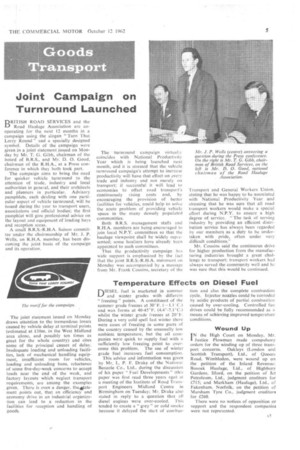Temperature Effe cts on Diesel Fuel
Page 7

If you've noticed an error in this article please click here to report it so we can fix it.
T-NIESEL fuel is marketed in summer
and winter grades with differeni " freezing " points. A constituent of the summer grade freezes at 30°F, (-1.1°C.) and wax forms at 40-45°F, (4.4°-7.1°C.) whilst the winter grade freezes at 20°F. During a very cold spell last winter there were cases of freezing in some parts of the country caused by the unusually low ambient temperature, but the oil companies were quick to supply fuel with a sufficiently low freezing point to overcome this problem. The use of winter grade fuel increases fuel consumption.
This advice and information was given by Mr. L. P. F. Drake of the National Benzole Co., Ltd., during the discussion of his paper "Fuel Developments" (this paper was first read three years ago) at a meeting of the Institute of Road Transport Engineers Midland Centre in Birmingham on Tuesday; Mr. Drake also stated in reply to a question that all diesel engines were over-cooled. This tended to create a " grey " or cold smoke because it delayed the start of corn bus tion and also the complete combustion cycle. Injector nozzles could be corroded by acidic products of partial combustion caused by over-cooling. Controlled fan drives could be fully recommended as a means of achieving improved temperature conditions,
Wound Up
IN the High Court on Monday, Mr.
Justice Plowman made compulsory orders for the winding up of three transport concerns. Oakleys (London and Scottish Transport), Ltd., of Queens Road, Wimbledon, were wound up on the petition of the Inland Revenue: Busoak Haulage, Ltd., of Highbury Gardens, Ilford, on the petition of Jet Petroleum. Ltd., judgment creditors for £715; and Markham (Haulage), Ltd., of Fakenham, Norfolk, on the petition of Marsham Tyre Co., judgment creditors for £260.
There were no notices of opposition or support and the respondent companies were not represented.




















































































































